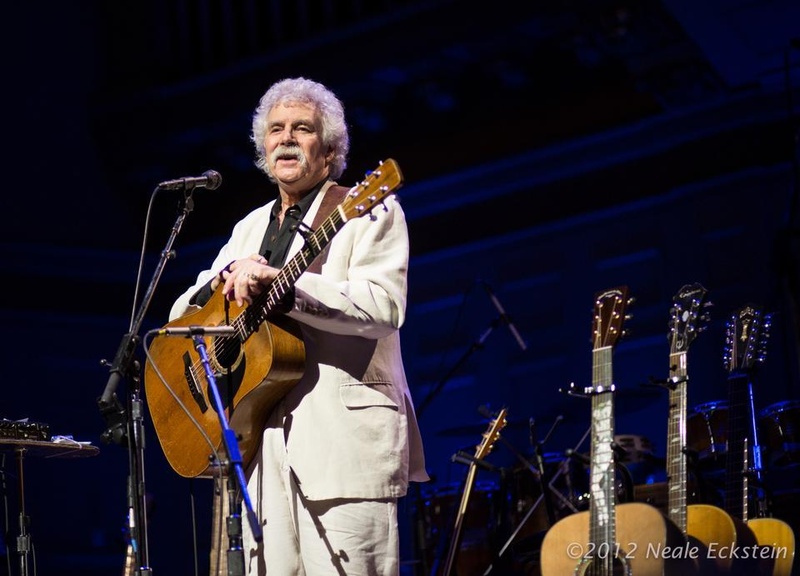It started with a ukulele. Tom Rush ’63-64 was ten when his cousin Beau taught him how to play. Rush says that his prior five years of piano lessons had been torture, but on the ukulele, he had fun. Soon, Rush graduated to the baritone ukulele, an instrument that “felt pretty manly” compared to its predecessor, and before long he was strumming a guitar.
Taking classes in the Yard by day and playing venues and coffeehouses in the Square by night, Rush launched a successful career during his undergraduate years at Harvard. A force on Harvard’s bustling folk scene, Rush would become an important figure in folk revival in 1960s and 70s.
TROLLING THE HOOTENANNIES
Rush’s love of music quickly translated into performance. During his years at Groton School, Rush used his ukulele to do imitations of Elvis and other popular musicians of the day.
“He had the hair for it, too,” remembers Phil Tilney ’63, Rush’s Harvard roommate of three years and a fellow Groton classmate.
Born in 1941 in Portsmouth, New Hampshire, Rush’s father worked at St. Paul’s School in Concord, New Hampshire. While Rush imitated popular musicians at Groton, Rush’s musical interest turned to folk when he arrived at Harvard in 1959.
“When I got to Cambridge, it was a hotbed of folk music,” Rush remembers.
While at Harvard, Rush majored in English and hosted a folk show on WHRB, Harvard’s radio station, called “Balladeers.” The show lasted for 30 minutes on Tuesdays, and hosting the program required Rush to find guests to perform live on the air.
“I started trolling the hootenannies to find guests for the show,” Rush recalls. The hootenannies were folk music parties that included an open mic component. In frequenting local hootenannies, Rush learned that he could get admitted to performances for free if he had a guitar with him. He could even get in for free with an empty guitar case.
FLAGSHIP OF FOLK
Rush spent the summer after his freshman year performing on the streets of Paris, which Tilney believes gave him the confidence to start performing at venues regularly when he came back to Cambridge.
“Between The Unicorn, The Golden Manatee, Café Yana, and Club 47 one could get three to four gigs a week if he was popular, and Tom was popular,” recounts Betsy Siggins who ran Club 47 when Tom performed there. Club 47, now Club Passim, is in a basement on Palmer Street, near what is now LF Stores and across from the COOP.
“Tom was quite exceptional in the fact that he was a Harvard student first, and a folk musician second,” she says.
Rush felt that Club 47 was “the flagship of the fleet” of folk coffee houses, and he performed there on an almost weekly basis throughout his undergraduate years.
“The older generation would come here and play for the kids, and sometimes the kids would get a chance to play for them, too,” he said. This collaboration and exchange, passing down of music between the generations, continued to be an important part of Rush’s musical career and legacy.
Read more in News
Journalist Ellen Goodman '63, Frequent Recounter of 'CliffeRecommended Articles
-
Group Celebrates Local Folk Music LegaciesIn 1958, a young, soon-to-be Boston University dropout named Joan Baez played her first live show. It was at a venue called Club 47 just outside of Harvard Square, and only eight people were in attendance.
-
Springsteen Emulates Former Glory In Folk Hero PersonaThis is an admirable attempt at modernized Depression-era folk protest music, but between the lazy lyricism and the cluttered production, the song comes across as forced.
-
 Past Tense: Club Passim
Past Tense: Club Passim -
 September Revival Month: Celebrating Harvard Square's Art and Culture
September Revival Month: Celebrating Harvard Square's Art and Culture -
 What Happened to Harvard Square's Music Scene?
What Happened to Harvard Square's Music Scene? -
Massey Lecture Profiles Bob Dylan's Murder BalladTo complement his detailed description of the song’s sound, Marcus finally played the recording of the song from “The Times They Are a-Changin’.” The audience sat in silence as they listened to Dylan’s recorded voice sing, “Well there’s seven people dead / On a South Dakota farm / Somewheres in the distance / There’s seven new people born.”














